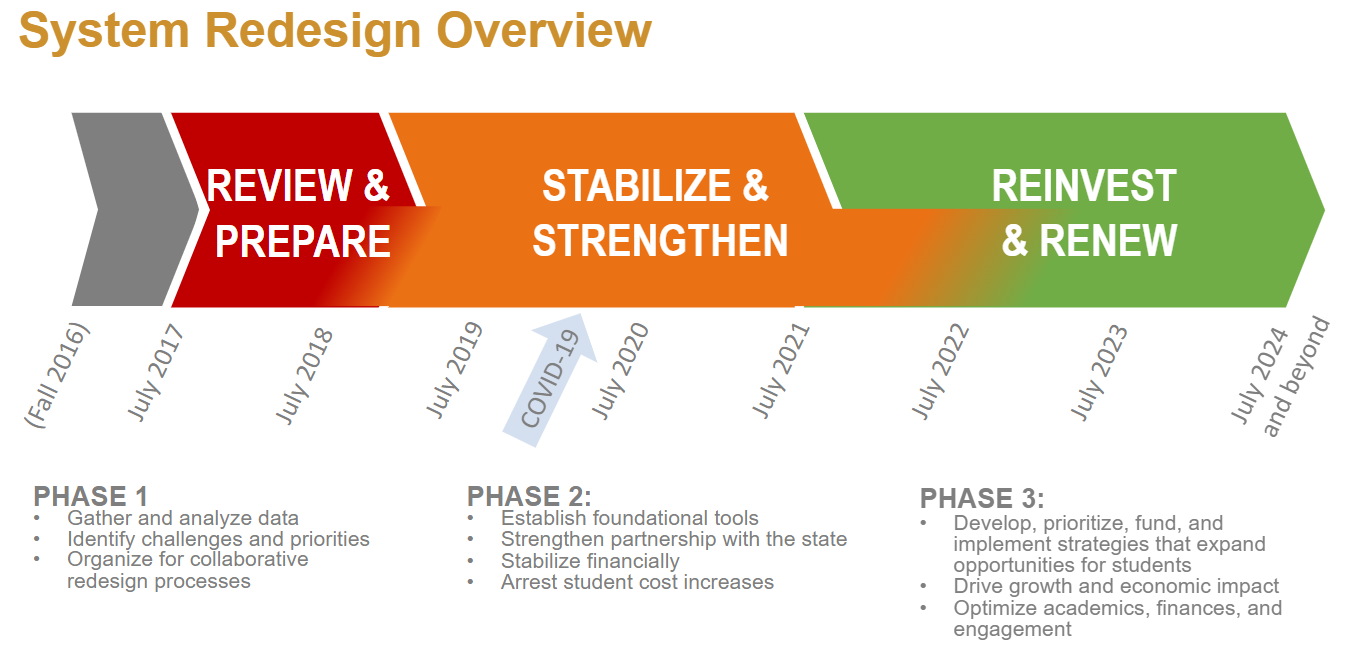System Redesign has provided a roadmap for universities and the System to address financial and operational changes so students from every background would continue to have access to affordable, high-quality public higher education.
The Evolving Landscape of Public Higher Education
Nationwide, colleges and universities are grappling with significant challenges: declining enrollment, evolving student needs, lagging state funding, and rising costs. The challenges have been particularly acute for Pennsylvania’s State System of Higher Education (PASSHE). As a result, the system set upon an innovative and bold redesign effort to fundamentally transform education and business models while prioritizing student success.
Confronting Reality
In 2016, PASSHE universities were at a crossroads. Years of underfunding by the state and deep cuts during the Great Recession created tremendous financial pressure on universities. The resulting tuition increases and drop in the high school-age population caused a significant enrollment decline just as the state needed more people with credentials and college degrees. The State System had to change and rebuild trust with state government leaders for the long-term success of students, universities and Pennsylvania's economy.
Rethinking Everything
The Board of Governors and then-chancellor Frank Brogan launched a strategic review in late 2016 — looking at everything from top to bottom — to identify necessary changes to ensure the long-term success of its students and universities. In 2017, the review led to the “System Redesign,” a commitment to long-term university stability so PASSHE universities could continue serving their students, regions, and all of Pennsylvania. The groundwork for this effort was led by then-interim chancellor Karen Whitney.
Results of System Redesign
In 2018, then-chancellor Dan Greenstein led the System Redesign through a multi-phase, system-wide effort to 1) advance student success, 2) leverage universities’ strengths as a system, and 3) enhance "systemness" through accountability and governance.
The system has made transformative changes, setting it on a new trajectory. While there is more work to do on every front, today PASSHE enjoys the following:
- Improved financial stability for the system.
- Improved enrollment trends that include flattening a decade-long enrollment decline.
- Improved affordability due to tuition frozen since 2018.
- Improved legislative relationships that have built support and trust among the system, the General Assembly, and the Governor’s office; and
- Significantly increased state investment by more than 30% in the last few years.
As part of the System Redesign effort, PASSHE integrated six existing universities into two larger institutions to preserve students’ access to higher education. Those two integrated universities offer more degree programs together than any of the six individual institutions could alone. While much progress has been made, the work has been demanding for everyone involved, and the system is committed to providing ongoing leadership and support for the students, faculty, staff, and leaders of these institutions as they continue to chart new courses to ensure their success. At the same time, the system continues to closely monitor and enhance the ongoing health of the other universities in the system. All of them are achieving higher levels of financial sustainability, but they face the same threats other universities around the nation face.
The Road Ahead
As with many institutions across the country, PASSHE has felt the effects of demographic
changes that have impacted the enrollment of traditional-aged college students. As
such, the system has the opportunity to consider how to reach these and other underserved
students better. The universities are laying a foundation for building high-quality
and industry-aligned non-degree credentials, shared academic programs, a systemwide
student information system, and other efforts that help serve a much wider array of
students.
Dr. Chris Fiorentino began his tenure as chancellor focused on "finishing what we
started" as it relates to System Redesign (see July 2025 blog) — a series of intentional actions that ensure PASSHE uses its resources wisely by
optimizing around academics, finances, and engagement. These final steps represent
the necessary work to prepare PASSHE for what comes next.
Outcomes
-
ADVANCING STUDENT SUCCESS
System Redesign strengthened PASSHE’s partnership with state government leaders, prioritizing transparency and fulfilling commitments to advance student success. PASSHE is expanding student learning and career opportunities by collaborating with various organizations to enhance internships and credentials linked to high-demand fields in Pennsylvania. As a result, PASSHE has received a 30% increase in state funding since 2021, along with $370 million in one-time funds, while the State System has saved over $430 million through efficiency efforts since 2019.
-
LEVERAGING UNIVERSITIES’ STRENGTHS
System Redesign included the unprecedented step of creating two regional institutions by bringing together three universities in western Pennsylvania (California, Clarion, and Edinboro) to create Pennsylvania Western University (PennWest), and three universities in northeastern Pennsylvania (Bloomsburg, Lock Haven, and Mansfield) to create Commonwealth University. These two new institutions provide students access to more academic programs and opportunities while providing greater financial stability to the universities.
-
ENHANCING “SYSTEMNESS”
As a result of the System Redesign initiative, OneSIS was created. In October 2019, the Board of Governors confirmed the decision to transition to a shared student information system. Adopting a single SIS has allowed PASSHE to operate more cohesively as a university system in various areas. It has established a framework for standardized business processes, improved student outcomes, facilitated common IT modules, provided a modern, cloud-based platform, increased efficiency, improved IT maturity, and enhanced cybersecurity. When fully functional, students will have access to a wide range of academic programs offered by all PASSHE institutions for the first time.

